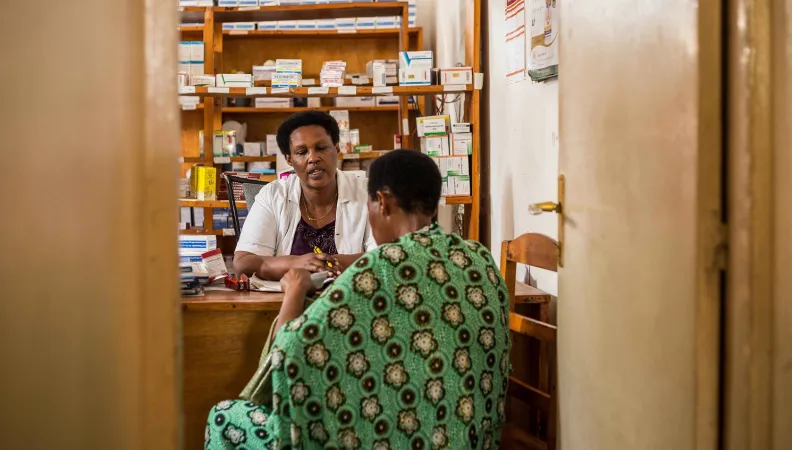 Africa remains a young continent. However, the ongoing demographic transitions are accompanied by an anticipated aging population — and in some countries, this process has already begun. Although a wide variety of situations coexist across the continent, the growing number of older people will require significant adjustments to public policies, including fiscal, health, and social measures.
Africa remains a young continent. However, the ongoing demographic transitions are accompanied by an anticipated aging population — and in some countries, this process has already begun. Although a wide variety of situations coexist across the continent, the growing number of older people will require significant adjustments to public policies, including fiscal, health, and social measures.
Context
In many African countries, older people still represent a very small share of the population (3% in sub-Saharan Africa and 5.6% in North African countries). For a long time, they have been largely overlooked by public policies, which have focused instead on the most urgent needs of economic, social, and health development — primarily targeting children and young adults.
However, the number of older people is increasing — not only in absolute terms but soon also in relative terms, with aging projected to occur more rapidly than in other regions. The challenge now is to design and implement appropriate public policies to support this demographic shift, particularly in the areas of health and social protection.
New forms of coverage and protection are emerging — or becoming essential — such as cash transfers, which complement family-based solidarity systems, free healthcare and services for older adults, the expansion of so-called universal pension and retirement schemes, and more broadly, private support systems on which most older people on the continent must still rely.
Objectives
This research project provides a framework for understanding population aging and related public policies across the African continent, from a comparative perspective. It examines the aging process, its associated challenges, the public policies addressing it, and the institutional frameworks in various countries, focusing on emblematic case studies that reflect diverse situations (South Africa, Cameroon, Cape Verde, Kenya, Morocco, and Senegal). The project also includes targeted analyses based on recent data, highlighting the contributions of demographic research to issues of health and social protection (notably pensions) for older adults.
The project resulted in a valuable overview for policymakers in AFD’s partner countries, contributing to broader reflections on the conditions under which different public policy models may or may not be replicated across the African continent.
Method
The project is based on a comparative analysis of secondary demographic data drawn from existing sources — including research papers, reports, and scientific literature. By presenting the different trajectories of demographic transitions, it offers an overview of aging across the continent, including its timing and context, and explores the associated challenges for both national and local public policies. It highlights regional, national, and subnational variations in aging, in order to identify the areas that are either most advanced in this process or experiencing the fastest pace of change.
Focused case studies on a selection of countries representing different situations provide a systematic critical review along the following lines:
- a socio-demographic and health overview;
- a description of the institutional framework and public policies in place;
- a critical analysis of the social and health-related challenges of the aging process;
- and an exploration of how aging is transforming family structures — particularly regarding intergenerational transfers, migration patterns, and women’s labor participation.
Results
The research project led to the following publications:
- The publication of the research paper “Africa Facing Its Aging Population: What Are the Challenges for Public Policy?” (in French, June 2024);
- The release of “How can healthcare for older people in sub-Saharan Africa be improved?” (April 2024);
- The publication of “Health Statistics on Older Adults in Sub-Saharan Africa: A Literature Review” (in French).
In July 2023, a webinar from the Research Conversations series presented the project’s initial findings (in French only):
Research findings
Africa is expected to face the challenge of an aging population in the coming decades. The first and foremost challenge lies in expanding social protection coverage, which is currently the lowest in the world: only 17% of the population is covered. This low rate is partly due to the predominance of the informal economy, which hinders the development of a contributory social protection system — particularly in rural areas. There is now a pressing need to strengthen public policies aimed at expanding social protection to a broader share of the population, both in rural and urban areas.
However, the evolution of social protection systems — particularly in health and pensions — rests on several key pillars that remain uncertain and have historically been prerequisites for their expansion:
- First, the effective collection and use of tax revenues to finance social protection;
- Second, the promotion of stronger links between pension and health coverage;
- And finally, sustained economic growth driven by a development model — historically industrial and manufacturing-based — that enabled the establishment of such public policies.
Yet in Africa, this economic model, centered on formal employment, has not taken root. Moreover, the impacts of climate change are raising fundamental questions about this development path, making it even more difficult to design and implement aging-related public policies — just as they are becoming increasingly necessary.
READ OUR RESEARCHER'S INTERVIEW
Serge Rabier: ‘Many African Countries Have No Social Protection Programmes For Elderly’
Want to stay updated on AFD’s latest research?
Contact
 AFD and the Economic Research Forum (ERF), in collaboration with the Egyptian Central Agency for Public Mobilization and Statistics (CAPMAS), are supporting the implementation of the fifth wave of the Egypt Labor Market Panel Survey (ELMPS). This new wave of the ELMPS survey aims to highlight the evolution of the Egyptian labour market, economy and society and thus provide essential data to analyze the effects of public policies in Egypt.
AFD and the Economic Research Forum (ERF), in collaboration with the Egyptian Central Agency for Public Mobilization and Statistics (CAPMAS), are supporting the implementation of the fifth wave of the Egypt Labor Market Panel Survey (ELMPS). This new wave of the ELMPS survey aims to highlight the evolution of the Egyptian labour market, economy and society and thus provide essential data to analyze the effects of public policies in Egypt.
Context
Labour market panel surveys (LMPS) are household surveys that allow to observe the evolution of labour market dynamics by following the same individuals over several years. Conducted in Egypt in 1998, 2006, 2012 and 2018, these surveys have become the focus of research on the labour market, human development, migration, the (de)composition of families and social protection. They make it possible to analyse the impacts of the various tax and monetary reforms undertaken in the country. The data also sheds light on the opportunities and challenges women face in the labour market.
Goal
This research partnership supports the implementation of the fifth wave of the ELMPS survey in Egypt by providing co-financing dedicated to data collection and dissemination. The objective of this collaboration is to support the production of the wave, as well as presentation chapters of this wave, four of which will be published as research papers to deepen knowledge on the Egyptian labour market. Particular attention will be paid to the analysis of the labour market situation in Egypt following the Covid-19 pandemic, thus providing relevant insights in this post-pandemic context.
Method
The new ELMPS 2023 wave is largely based on the questionnaire of the 2018 ELMPS survey, which addressed issues such as demography, employment, income, migration and well-being.
This edition differs from previous editions in several ways:
- It incorporates questions dedicated to assessing the impact of the Covid-19 pandemic;
- It broadens its coverage by including new components, such as the digital economy (gig economy) and employment measurement in the emerging green and circular economy sectors;
- It provides for a skills-based module, with the inclusion of a wider variety of skills, which will assess the extent to which workers' skills match the needs of the labour market.
These improvements are intended to ensure more comprehensive and representative data, thus providing a solid foundation for informed public policy development.
Results
The ELMPS 2023 database will be made available on the ERF website.
Research papers will focus specifically on:
- The role of internal migration in territorial dynamics;
- The evolution of the insurance system and its coverage;
- Technology in the labour market and its use;
- The green economy and the labour market.
A book will be published covering the themes of 1) labour supply; 2) employment structure; 3) inequalities; 4) mismatch between labour supply and demand; 5) gender and occupational segregation; 6) international migration; 7) social protection; 8) technology in the workplace; 9) green economy; 10) small and medium-sized enterprises (SMEs); 11) care activities (paid and unpaid); 12) food security and resilience to shocks.
Contacts:
- Dr. Cecilia Poggi, Research Officer, AFD
- Prof. Ragui Assaad, Humphrey School of Public Affairs, University of Minnesota

